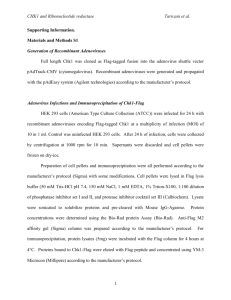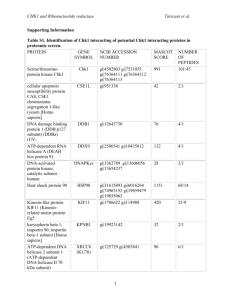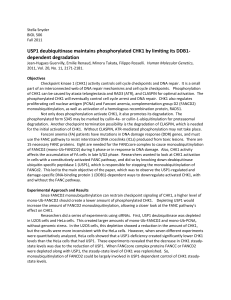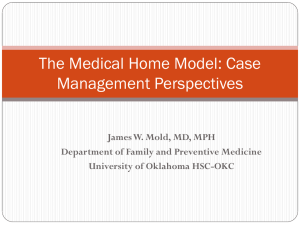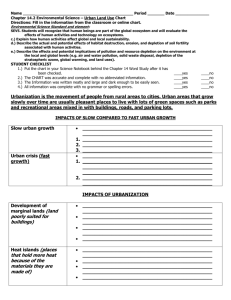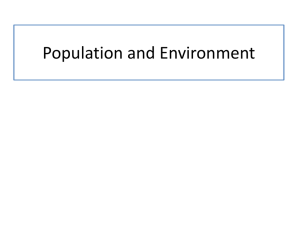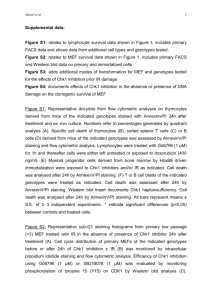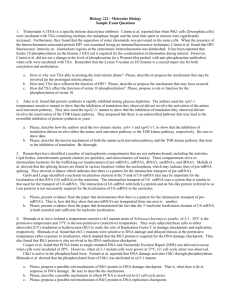Stella Snyder Presentation
advertisement
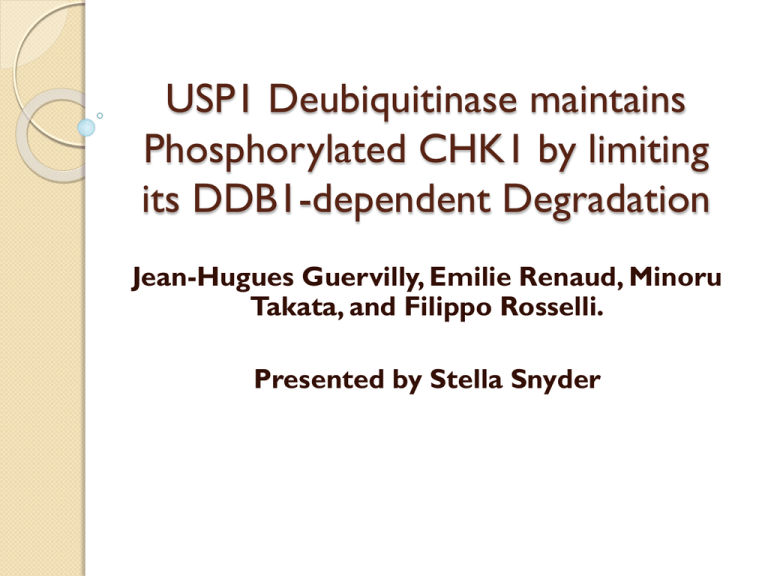
USP1 Deubiquitinase maintains Phosphorylated CHK1 by limiting its DDB1-dependent Degradation Jean-Hugues Guervilly, Emilie Renaud, Minoru Takata, and Filippo Rosselli. Presented by Stella Snyder Outline Introduction ◦ Checkpoint kinase 1 (CHK1) ◦ Fanconi anemia, complementation group D2 (FANCD2) ◦ Ubiquitin specific peptidase 1 (USP1) Experiments ◦ USP1 depletion impact on CHK1 ◦ USP1/CHK1 relationship independent of cell cycle and DNA repair ◦ USP1 limits DDB1 degradation of CHK1 Conclusion Future research Checkpoint Kinase 1 (CHK1) Controls DNA repair and cell cycle regulation Involved in monoubiquitinylation of FANCD2 and PCNA Activates RAD51 Phosphorylation activates CHK1 and promotes degradation ◦ S345 phosphorylated form Associated with resisting anticancer therapy FANC pathway 15 FANC proteins required for normal function ◦ Eight in FANCcore complex that catalyzes mono-Ub-FANCD2 and –FANCI ◦ Mono-Ub-FANCD2 regulates CHK1 Fanconi Anemia- Caused by mutations in DNA damage response genes Ubiquitin-specific Peptidase 1 (USP1) Deubiquitinase Restrains monoubiquitinylation of FANCD2/FANCI Will be shown to affect CHK1, steady state and phosphorylated ◦ With or without FANCD2 USP1 depletion effect on CHK1 FANCD2 monoubiquitinylation can restrain checkpoint signaling ◦ Higher amount of mono-Ub-FANCD2 should mean lower p-CHK1 level Researchers depleted USP1 to increase mono-Ub-FANCD2 ◦ Used siRNA in HeLa and U2OS cells ◦ Higher amounts of mono-Ub-FANCD2 and – PCNA without genotoxic stress U2OS cells USP1 depletion shows reduction in CHK1 Co-depletion of USP1 and FANC proteins rescued CHK1 USP1 depletion reduces pCHK1 and steady-state CHK1 after MMC HeLa Cells USP1 depletion reduces pCHK1 USP1 depletion more variable effect on CHK1 Needed to do quantitative analysis… Quantitative Analysis of HeLa Cells 7 individual experiments Show CHK1 levels to be significantly lower in USP1 deficient cells CHK1-FLAG construct CHK1-FLAG expressed in MRC5 fibroblasts Deprivation of USP1 or FANCD2 USP1 depletion shows increased mono-UbFANCD2, decreased CHK1 FANCD2 depletion shows increased CHK1-FLAG and pCHK1 FANCD2 Knock-out DT40 cells Ectopically corrected with WT FANCD2 and nonmono-Ub-FANCD2 (KR) FANCD2-deficient shows hyper-phosphorylated CHK1 Rescued by WT but not FANCD2-KR form Shows negative role of activated FANCD2 in CHK1 phosphorylation USP1 depletion in FA cells Depleted USP1 in FA-D2, FA-G, FA-C fibroblasts ◦ FANCD2-independent Still decreased CHK1 levels and phosphorylation Other pathways are available… Does USP1 Depletion Impact CHK1 Independent of Cell Cycle and DNA Repair? Lower level of CHK1 due to ◦ Changes in cell cycle? ◦ Increased DNA repair? Cell Cycle Distribution USP1 depletion shows no effect on unchallenged cells So, lower level CHK1 not due to cell accumulation in G1 Cell Cycle Recovery with MMC ◦ USP1-deficient U2OS re-enter cell cycle more rapidly than USP1 proficient ◦ USP1-deficient HeLa show prolonged G2 checkpoint Difference between Cell Lines? Differ in p53 status ◦ Repeated experiments with p53 inhibitor, no change Western blot analysis ◦ HeLa cells more p-CHK1 and p-CHK2 than U2OS ◦ MEFs more p-CHK2, less p-CHK1 CHK1 decrease not factor in checkpoint differences CHK1 Degradation due to Increased DNA Repair? Dot blot analysis ◦ Repair of 6-4 pyrimidine-pyrimidone lesions ◦ 6-4 PP eliminated equally, USP1 present or not ◦ DNA repair pathways are normal without USP1 CHK1 Degradation due to Increased DNA Repair by FANCD2? USP1 depletion showed defective relocalization ◦ Not consequence of ϒH2AX ◦ No enhanced DNA repair by mono-UbFANCD2 USP1 Limits DDB1-specific Degradation of CHK1 USP1 depletion shows lowered pCHK1 DDB-1 depletion shows rescued pCHK1 Co-depletion of USP1 and DDB1 rescued pCHK1 levels CHK1 and DDB1 Interaction ◦ Interaction between CHK1 and DDB1 enhanced without USP1 ◦ USP1 depletion did not affect CDT1 No steady-state reduction Did not promote degradation with MMC Conclusion USP1 controls a feedback loop that limits CHK1 activity CHK1 needed for mono-Ub-FANCD2 DDB1-dependent degradation of p-CHK1 Future Research DDB1 needs CUL4-associated factor ◦ One specific for CHK1? PCNA/FANCD2 interaction found ◦ Required for proficient mono-Ub-FANCD2? Bi-allelic FANC mutations in FA patients ◦ Ex. Patient with FANCA and FANCM mutations ◦ FANCM mutation compensated for FANCA mutation?
